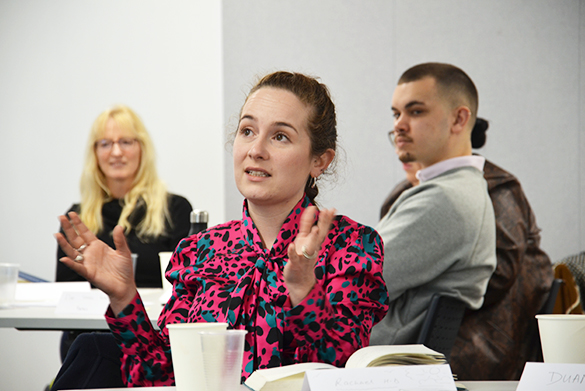Shaping sustainable futures course continues after successful pilot

Aligned with the wider goals of the School’s Centre for Sustainable Business (CSB) and following a successful pilot roll-out, the Shaping Sustainable Futures (SSF) short course will return for its second run in January 2025.
Launched in Autumn 2023, SSF is a three-day thought-provoking course created to empower and grow local sustainability leaders.
Drawing on CSB research, the course has been designed to enhance the strategic approach to sustainability of current professionals, by empowering them to reimagine how their organisations could contribute to shaping a better future.
The second cohort welcomes decision-makers who hold sustainability-related roles or can influence their organisation’s sustainability strategies, with applications open for those wanting to join in January 2025.
The course features a series of interactive workshops led by CSB specialist researchers and industry experts and offers participants evidence-based insights to help them develop, improve and implement effective sustainability strategies.
In these sessions, the delegates co-create and explore a range of alternative futures to reveal the impacts of critical uncertainties, and crucially their agency to shape a preferable future.
The workshops provide space for deep reflection and debate to advance participants’ ‘futures literacy’ to enable them to grow their impact as leaders in sustainability.
Conceived with the idea of enhancing and growing future sustainability leaders, the course is structured around three full-day sessions.
During two consecutive days, delegates will take part in interactive sessions and experiment with ‘futures thinking’ tools and approaches, starting on 21 January 2025, and will reconvene for day 3 on 26 March 2025 to share their progress and strategic plans.
“The vision behind the course is to show managers how they can create a more sustainable future and equip them with the skills needed to build it”, said CSB Director and Programme Leader Professor Joanne Meehan.
“We first look at where we are heading, moving from probable futures to plausible futures and ultimately, taking time to explore preferable futures, and asking ‘preferable for who?’
“This means taking a systems perspective, looking at blind spots in our attention, challenging the assumptions we make and exploring how we can collectively shape fairer and sustainable futures for our communities, organisations, and across industries.”
Successful pilot experience
The first run of the SSF course concluded on Wednesday 17 April and drew delegates from across the northwest, representing a diverse set of organisations including corporates, SMEs, start-ups, and not-for-profits.
In his keynote address on the course, Jeremy Nicholls, Sustainable Development Goals (SDG) Assurance Framework Lead of the UN Development Programme and CSB Advisory Board Member, stressed the importance of futures thinking in sustainability:
“We all know now that the world is in something of a crisis zone, with climate, with the destruction of nature and with the breakdown of social systems.”
“And we need to start with a real urgency thinking about what future we want the world to look like, and what we’re going to do to make it like that as far as is possible.”
“It's always good to get people who are in businesses in rooms sharing their experiences about sustainability and what they're trying to do at a personal level, in their businesses, and then linking that to the world's needs.”
For Creative Director at Phase Creative and course delegate, Sophia (Avraam) Polson, the experience has transformed her views on sustainability and found particularly enjoyable the discussions on the importance of bringing nature into business decisions:
“Some organisations are now having nature have a seat at the table in all of their corporate and business decisions.”
“It has really inspired me to always think of ways that we can incorporate nature or other SDGs into the business.
“That’s something I definitely aim to work towards with the clients I work with, raising awareness of the SDGs and how we can implement them into our businesses for, hopefully, a more sustainable future.”
The nature of the SSF course has encouraged delegates to tap into their emotions and how they can consider taking alternative perspectives to develop a comprehensive understanding of what makes a sustainable future.
Grow Wellbeing Programme Director and course participant, Duane Chong, joined the experience with a two-fold expectation: to gain a personal understanding of sustainability issues and to understand how these insights could help his organisation address the present and future challenges strategically.
According to Chong, an area that has exceeded those expectations is the opportunity to connect with like-minded peers, and he has already been able to collaborate with other delegates and their organisations.
Reflecting further on the course, Chong specifically found the workshop on corporate accountability and the move to communicate the true and fair costs and consequences of doing business on inequality, climate change and nature loss an eye-opening experience.
“We need to record the cost of our practice and our business as well as the social value and social impact”, said Chong.
“We’re in the business of connecting people to nature, so it’s really important that we look at the cost to nature as well.”
Applications open for January 2025
Applications are welcomed until Friday 22 Novemember 2024 for those wanting to join the second SSF cohort in January 2025, with a limited amount of fully funded places available for staff working in micro and small businesses (up to 20 staff) which have been successfully trading for at least one year.
